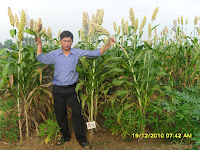Philippine ethanol plant uses sweet
sorghum
Ethanol plant uses sweet sorghum
Green Future Innovation Inc. (GFII), potentially Philippines’ biggest ethanol plant, will use sweet sorghum as
complementary feedstock when it begins running a primarily sugarcane-based
plant in Isabela in the first half this year.
Planned to be commissioned next month, GFII has already
started field trial of sweet sorghum within its plant area in San Mariano,
Isabela. By February, GFII will be planting sweet sorghum over a larger area of
100 hectares each for four consecutive months or a total of 400 hectares of
sweet sorghum planted by June this year.
“They will use sweet sorghum as a complementary crop when
they start operating by May,” said Dr. William D. Dar, International Crops
Research Institute for the Semi Arid tropics (Icrisat) said during the
Philippine International Bioenergy Conference over the weekend.
GFII is a joint venture between Itochu Corp of Japan, JGC
Corp.-Japan, Philippine Bioethanol and Energy Investment Corp. and Taiwanese
holding firm GCO. The Isabela plant has a production capapcity of 200,000
liters of bioethanol per day or 54 million liters per year. This is close to
the combined capacity of the two bioethanol operating plants San Carlos
Bioenergy and Roxol Bioenergy with a total of 68 million liters per year.
The new ethanol plants have sustained their
interest in sweet sorghum as cost-effective complementary feedstock to
sugarcane or molasses as economic feasibility showed a profitable growing of
the feedstock.
Sweet sorghum can generate a net income of P83,962 for two
croppings in a year at a cane yield of 50 metric tons (MT) per hectare and seed
(grain) yield of three MT per hectare, a University of the Philippines-Los Banos-Bureau of Agricultural
Research (BAR) study showed.
The Philippines has to keep with developments in
sweet sorghum growing worldwide as ethanol leader Brazil is already embracing it.
“Private companies in Brazil are partnering with us in doing
research on sweet sorghum. (They’re a leader in sugarcane ethanol), that’s why they’re tapping sweet
sorghum as a visibility advantage,” Dar said. The potential is “the big
sugarcane” area in Brazil.
US multinational Du Pont’s seed company Pioneer and Advanta,
an Indian global seed company, have started working with Icrisat on sweet
sorghum.
Philippines had the lead in getting the support
of ICRISAT over the last five years. Icrisat is an international organizations
funded by a network of private-public groups supporting the Consultative Group
for International Agricultural Research (CGIAR).
It has been extending its technical assistance to the Philippines through its superior varieties and
support for field trials initiated by BAR since 2006.
“It costs us $500,000 dollars to develop a line. If we gave
1,000 varieties to the Philippines, it means we’ve given half a
billion dollar. Of course, Icrisat is investing not only for the Philippines but for other developing countries
in the world,” Dar said.
Nguồn:
biofuelschat.com






